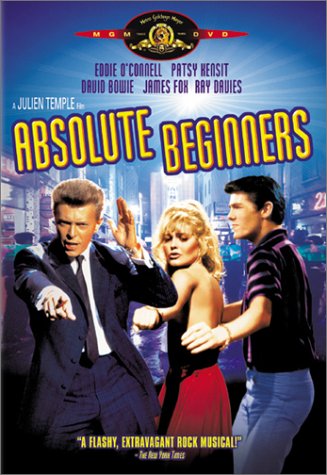
ABSOLUTE BEGINNERS
UK, 1986, 108 minutes, Colour.
Patsy Kensit, Eddie O’ Connell, David Bowie, James Fox, Mandy Rice- Davies, Steven Berkoff, Sade, Bruce Payne.
Directed by Julien Temple.
Absolute Beginners was a British attempt to do something with the musical on-screen. It was directed by Julien Temple who had made a name for himself with music videos in the 1980s and such films as The Great Rock ‘n Roll Scandal. He was to venture into feature films at various times including Vigo and the study of Coleridge and Wordsworth, Pandemonium.
The film is set in the late 50s, an anticipation of the swinging life in London of the 60s as well as the race riots. It is also set in the world of fashion and photography. The film stars Patsy Kensit as a model, David Bowie as an eccentric entrepreneur and James Fox as Henley of Mayfair, the dressmaker to the queen. Various cult performers also make appearances including Mandy Rice- Davies (from the political scandals of the 1960s), playwright Steven Berkoff and model Sade.
The film was not a commercial success on release. However, many want to go back to it as a symbol of 80s film-making and a breakthrough in visual style – especially to be judged in the later success of the showiness of the music video and its influence on feature films.
1.A stylised musical, slice of life? The British perspective?
2.The work of Julien Temple, his background in music videos? His feature films and documentaries? His interest in this world and personalities, their eccentricities?
3.The film based on a novel, the setting of 1958, a memoir? An old world? An 80s interpretation of the 50s – and reassessment?
4.The importance of the stylisation, the artificial world the film created? The style of colour and splash? Sets and décor? London of the period, interiors? Costume design? The editing and pace? The range of backgrounds of the cast?
5.The musical score, the songs, their range? Insertion into the narrative? The performance of the songs? The lyrics? The revolutionary perspective?
6.The title, the perspective?
7.The structure of the film, pastiche, the various turns? The thinness of the plot – the surface show? The characters?
8.Colin, his background, his relationship with his father? The hero of the film? The photographer of the period? The sex perspective, pornography? Napoli, Soho? His friends? His obsession with Crepes Suzette? His entrée into the fashion world? The encounters with Henley? His family background and his ability to cope?
9.Harry Charms as record producer, personality and presence? Colin’s encounter with him? Baby boom, the promotion? Henley? Vendice Partner and business? James Fox and David Bowie in this kind of film, their screen presence, style?
10.The television background, Call Me Copper? TV culture, photography? The raids on the rooms? The scheme?
11.The riots, the rescue? The rally and Suzette? Flikker and the fight? Suzette and the end? Colin and his odyssey through an ugly England?
12.Suzette and fashion, Colin, the reactions? Henley and Suzette? The marriage? The homosexual background? Leaving, the club, the end?
13.Henley, the chic world, dressmaker to the queen, style, personality, marrying? The plan?
14.Partners and David Bowie, the party, the discussions?
15.Mr Cool, Sister and the group, life, involvement, survival? Colin and his plans?
16.Dido Lament, gossip? The role of the gossip columnist in this world?
17.The background of the race issues, the prejudice against blacks in London? Fanaticism, the rallies, the teddy boys? The riots? Demolition – and peace?
18.The film as an attempt to do something different in the British film industry? Drawing on a range of talent? Assessment of a particular period? The film seen in retrospect?